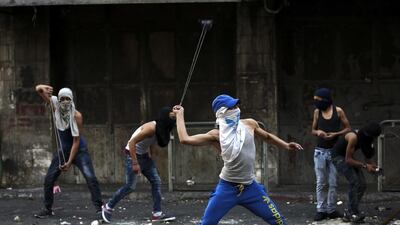When the hawkish Israeli politician Ariel Sharon visited Jerusalem’s Al Aqsa compound in September 2000, Palestinians were on the verge of a second uprising, or intifada, against Israeli rule.
Fed up with the 1993 Oslo Accords that failed to end Israel’s occupation of the West Bank and Gaza Strip, Palestinians made a decision to change the status quo through armed resistance. Five years after that fateful visit, the Palestinians were left with deep wounds in a worse-off position after fighting the Israeli army.
Last week, one of Israel’s largest newspapers ran the front-page headline “The Third Intifada”, regarding the violence currently consuming Jerusalem and the West Bank.
This was deliberately misleading. Palestinians know they must reform their own leadership and its relationship to Israel as part of any genuine uprising against Israeli rule — something that doesn’t appear likely in the short term.
Intifadas are strategic, not simple reactions to isolated events, or even sustained Israeli incitement. The first intifada was a declaration that Palestinians refused to accept Israel’s slow annexation of the West Bank and the expanding occupation. The second intifada was an attempt to use violence to change the status quo.
Since the arson attack that killed a Palestinian family in the West Bank village of Duma in late July, Palestinians have reacted to the rising tensions on the ground with no clear goal or end point. Palestinian president Mahmoud Abbas’ reticent approach towards popular uprisings and the fear of repeating the mistakes of the second intifada add to the lack of appetite for full-scale rebellion in the West Bank.
Having invested a lot of political capital to defeat the US nuclear deal with Iran and then failed, Mr Netanyahu has turned his sights on the Palestinians in Jerusalem and the West Bank. Tel Aviv is now worried that a shift in American foreign policy in the Middle East — away from traditional allies and towards a warmer relationship with Iran — is on the horizon.
Mr Netanyahu is therefore trying to demonstrate Israel’s relevance to American foreign policy by visibly reminding US lawmakers that the country is vulnerable and at the heart of the region’s many conflicts. For its part, the Obama administration is consumed with the crisis in Syria, and the Israel-Palestine conflict appears to be off the radar of American officials, at least for the time being.
As a politician who is losing popularity at home and abroad, the Israeli prime minister is in desperate need of a scapegoat that will allow him to appear as a security-conscious leader.
This September, Israel allowed hundreds of extremist Jews to visit the Al Aqsa compound in a move designed to inflame tensions. Predictably, the tension boiled over into the current violence.
At Mr Netanyahu’s behest, the Israeli government has declared war on stone throwers with legislation that allows looser rules of engagement for security forces and harsh minimum sentences for those caught.
Stone throwing has been part and parcel of Palestinian resistance since the beginning of the conflict and as such, the timing of this “war” suggests that fresh legislation serves the dual purpose of empowering Mr Netanyahu’s security-minded base constituents as well as pushing the Palestinians towards more violent means.
If the gap in the punishment for throwing stones and firing weapons closes, the result will be more Palestinians taking up arms as the fighting intensifies. In the last week alone, there have been three knife and gun attacks in Jerusalem and the West Bank that have killed four Israeli civilians. According to the Palestinian Red Cresent nearly 500 Palestinians have been injured and two Palestinians, including a 13-year-old boy have been killed since Friday.
Israel is also blaming Mr Abbas for the current wave of violence, accusing him of incitement with his “bombshell” comments at the United Nations General Assembly, in which he announced that the Palestinians would begin to ignore agreements with Israel such as the Oslo Accords.
The facts don’t support this claim, however. Mr Abbas’s bombshell was more of a bluff, a way to buy time while he considers the future of the Palestinian Authority (PA).
For the PA to ignore agreements with Israel, it would have to unilaterally dissolve ongoing security cooperation with Israel that has tirelessly suppressed Palestinian dissent directed towards the PA itself inside urban areas of the West Bank since 2005.
With clashes between Palestinians and Israeli security forces on the rise, Mr Abbas would be inviting unwanted questions for his Ramallah leadership about the depth of Israeli-PA cooperation. If Mr Abbas pulls the thread, the PA’s entire ball of yarn could unravel.
Both Israel and the international community don’t seem eager for another Israeli attack on Gaza; Hizbollah remains a powerful deterrent in southern Lebanon; and the Iranian menace that was once favoured as a scapegoat by Mr Netanyahu is about to sign a deal with Washington.
The Israeli prime minister has nowhere else to pick a fight to create a media diversion and maintain his image as a tough leader than his own backyard. But that doesn’t mean we are headed for another intifada in the coming weeks.
Only when the Palestinians decide to reform their own leadership will we be close to an intifada against Israeli rule.
jdana@thenational.ae

